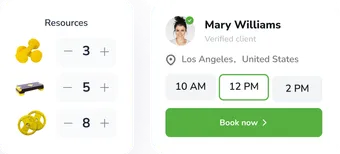How to succeed in life coaching business
Stepping into life coaching is like embarking on an exciting journey full of opportunities and challenges. Nowadays, many people are looking for guidance to navigate their lives better, both personally and professionally. As a life coach, you can be a source of support and inspiration for others. But how do you ensure you're not just another coach but someone who makes a difference?
In this article, we'll explore the key ingredients for a successful career in life coaching. From building your expertise and credibility to connecting with people effectively and using smart marketing tactics, we'll uncover the secrets to creating a thriving coaching business. Join us as we break down the essentials of the life coaching profession, helping you build a practice that helps your clients achieve their dreams and brings you personal satisfaction and success.
The average wage for a life coach varies widely depending on factors such as experience, specialization, location, and availability of a booking website. Still, it typically ranges from $50 to $300 per hour.
The cost to start a life coaching business can vary significantly depending on factors such as training and certification expenses, marketing efforts, website development, and necessary office or equipment purchases. Still, a rough estimate could range from $1,000 to $10,000.
Online appointments can become a great tool for life coach business optimization. They help attract more clients and manage the business all in one app.

Business plan for life coaches
Embarking to establish your life coaching practice requires careful planning and strategic execution. This seven-step business blueprint will equip you with the tools and insights needed for success.
Define niche and target audience:
Identify your coaching specialty or niche based on your expertise, passions, and the needs of your target market.
Conduct market research to understand your ideal clients' demographics, challenges, and aspirations.
Develop a unique value proposition:
Craft a compelling message communicating the specific benefits and outcomes clients can expect from working with you.
Highlight what sets you apart from other coaches and why potential clients should choose your services.
Establish brand and online presence:
Create a professional brand identity, including a memorable logo, color scheme, and voice.
Build a user-friendly website that showcases your services, testimonials, and blog content to attract and engage potential clients.
Set pricing and service packages:
Determine your coaching rates based on your experience, credentials, and the value you provide.
Develop tiered service packages that cater to different client needs and budgets, offering options for one-on-one coaching, group sessions, workshops, or online courses.
Create a marketing plan:
Identify marketing channels that align with your target audience, such as social media platforms, email marketing, networking events, or speaking engagements.
Develop a content strategy to share valuable insights, tips, and success stories that resonate with your audience and demonstrate your expertise.
Establish client acquisition and retention strategies:
Implement lead generation tactics such as offering free consultations, webinars, or downloadable resources to attract potential clients.
Nurture client relationships through regular communication, personalized support, and ongoing value delivery to encourage repeat business and referrals.
Monitor and adapt:
Track key performance indicators (KPIs) such as client acquisition costs, conversion rates, and client satisfaction metrics to assess the effectiveness of your strategies.
Continuously evaluate and refine your business plan based on feedback, market trends, and evolving goals to ensure long-term success and growth in your life coaching practice.

Life coaching as a business – finances
Certification or training courses:
Cost: Varies, typically ranging from a few hundred to several thousand dollars.
Details: Expenses include tuition, course materials, and examination fees for obtaining certification from reputable coaching organizations.
Website development:
Cost: Typically $500 to $3000 or more.
Details: Includes domain registration, hosting, and web design expenses to create a professional online platform for marketing your services.
Pro tip: EasyWeek booking software can provide you with a functional UI/UX website for absolutely no cost.
Marketing materials:
Cost: Generally $100 to $500 or more.
Details: Expenses include designing and printing business cards, brochures, and flyers to promote your coaching services.
Online presence:
Cost: Varies, from $0 for basic social media profiles to a few hundred dollars per month for advanced marketing tools.
Details: Includes setting up social media profiles, listing services in online directories, and investing in email marketing.
Insurance:
Cost: Typically $500 to $2000 annually.
Details: Covers professional liability insurance to protect against legal claims arising from coaching services.
Office space (If applicable):
Cost: Ranges from $200 to $2000 or more per month.
Details: Includes expenses for renting office space, utilities, and furnishings if meeting clients in person.
Software:
Cost: Varies, typically $20 to $200 or more monthly.
Details: Covers essential tools like scheduling apps, video conferencing platforms, and client management systems.

How to become a life coach on a budget
When starting a life coaching business, utilizing online appointment software systems can offer cost-effective solutions by automating scheduling tasks and reducing the need for manual administrative work.
These systems provide 24/7 accessibility for clients to book appointments at their convenience while reducing no-shows through automated reminders. Additionally, they improve the overall client experience by offering seamless booking processes and integration with other business tools, ultimately contributing to increased efficiency and scalability as the business grows.
Try EasyWeek booking app for life coaching to leverage your life coaching business performance from day one.















